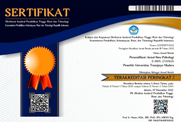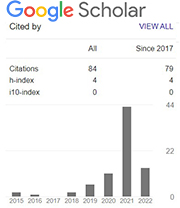Peran Resiliensi, Positive Social Relationships, dan Health Belief terhadap Kesejahteraan Emosi Pasien Hemodialisis
Abstract
Individu didiagnosis dengan penyakit ginjal stadium akhir dan harus menjalani perawatan hemodialisis memiliki implikasi bahwa menjadi tergantung pada pengobatan seumur hidup. Sejumlah studi melaporkan pasien hemodialisis mengalami beban simtom dan terganggunya well-being akibat penyakit maupun perawatan hemodialisis. Penelitian ini bertujuan untuk menguji peran resiliensi, positive social relationships, dan health belief terhadap emotional well-being pasien hemodialisis. Subjek penelitian yaitu pasien penyakit ginjal stadium akhir yang menjalani hemodialisis secara rutin di Instalasi Hemodialisis RSU Dr. Soetomo, Surabaya yang dipilih melalui purposive sampling, artinya dipilih berdasarkan pertimbangan kriteria tertentu dan kesediaan berpartisipasi. Penelitian ini melibatkan pasien hemodialisis sejumlah 55 orang terdiri dari 34 laki-laki dan 21 perempuan, berusia 26 – 60 tahun. Menggunakan metode kuantitatif dengan melakukan survei, pengumpulan data dilakukan menggunakan lima Skala yakni Scale of Positive and Negative Experience (SPANE) dan Satisfaction with Life Scale (SWLS), 10-Item Connor-Davidson Resilience Scale (10-Item CD-RISC), Medical Outcomes Study Social Support Survey (MOS-SSS), dan Skala Health Belief. Analisis data dilakukan dengan analisis statistik uji regresi ganda. Hasil uji regresi ganda menunjukkan bahwa hipotesis ditolak, artinya resiliensi, positive social relationships, dan health belief secara simultan tidak dapat memprediksi emotional well-being pasien hemodialisis (F sama dengan 2,363, p lebih besar dari 0,05). Secara parsial, berdasarkan nilai t diketahui hanya resiliensi memberi kontribusi signifikan terhadap emotional well-being (t sama dengan 2,342, p lebih kecil dari 0,05), sementara positive social relationships dan health belief masing-masing memberi kontribusi tidak signifikan terhadap emotional well-being. Penelitian berikutnya diharapkan dapat membantu meningkatkan coping resources yakni resiliensi yang bermanfaat mendorong perkembangan emosi positif, serta dapat membantu memberi edukasi terkait penyakit ginjal dan hemodialisis sehingga pasien memiliki pemahaman, respon permasalahan, dan belief yang lebih positif.
Keywords
Full Text:
PDFReferences
Angner, E., Ghandhi, J., Purvis, K. W., Amante, D., & Allison, J. (2013). Daily functioning, health status, and happiness in older adults. Journal of Happiness Studies, 14, 1563-1574. doi:10.1007/s10902-012-9395-6
Ayers, S., & de Visser, R. (2011). Psychology for medicine. London: Sage Publications.
Bishop, A. J., Martin, P., & Poon, L. (2006). Happiness and congruence in older adulthood: A structural model of life satisfaction. Aging and Mental Health, 10(5), 445-453.
Campbell-Sills, L., & Stein, M. B. (2007). Psychometric analysis and refinement of the Connor-Davidson Resilience Scale (CD-RISC): Validation of a 10-item measure of resilience. Journal of Traumatic Stress, 20(6), 1019-1028.
Chida, Y., & Steptoe, A. (2008). Positive psychological well-being and mortality: A quantitative review of prospective observational studies. Psychosomatic Medicine, 70, 741–756.
Compton, W. C. (2005). An introduction to positive psychology. Belmont, CA: Thomson Wadsworth.
Connor, K. M., & Davidson, J. R. T. (2003). Development of a new resilience scale: The Connor-Davidson Resilience Scale (CD-RISC). Depression and Anxiety, 18(2), 76-82.
Creswell, J. W. (2010). Research design: Pendekatan kualitatif, kuantitatif, dan mixed (ed. ke 3). Diterjemahkan oleh: Achmad Fawaid. Yogyakarta: Pustaka Pelajar.
Diener, E., Emmons, R. A., Larsen, R. J., & Griffin, S. (1985). The Satisfaction with Life Scale. Journal of Personality Assessment, 49(1), 71-75.
Diener, E., & Lucas, R. E. (2000). Subjective emotional well-being. Dalam M. Lewis & J. M. Haviland-Jones (Eds.), Handbook of emotions (2nd ed., pp. 325–337). New York: Guilford Press.
Diener, E., Oishi, S., & Lucas, R. E. (2003). Personality, culture, and subjective well-being: Emotional and cognitive evaluations of life. Annual Review of Psychology, 54, 403–426.
Diener, E., Wirtz, D., Biswas-Diener, R., Tov, W., Kim-Prieto, C., Choi, D., & Oishi, S. (2009). New measures of well-being. Dalam E. Diener (Ed.), Assessing well-being: The collected works of Ed Diener (pp. 247-266). New York: Springer.
Field, A. (2009). Discovering statistics using SPSS (3rd ed.). London: Sage Publications.
Griva, K. (2014). Illness and treatment beliefs, cognitive functioning and quality of life in end stage renal disease (ESRD) (Doctoral dissertation). Available from ProQuest Dissertations and Theses database. (UMI No. U602524)
Gutch, C. F., Stoner, M. H., & Corea, A. L. (1993). Review of hemodialysis for nurses and dialysis personnel (5th ed.). St. Louis: Mosby.
Hagger, M. S., & Orbell, S. (2003). A meta-analytic review of the common-sense model of illness representations. Psychology of Health, 18, 141-184.
Kail, R. V., & Cavanaugh, J. C. (2013). Human development: A life-span view (6th ed.). Belmont, CA: Wadsworth.
Kao, T. W., Lai, M. S., Tsai, T. J., Jan, C. F., Chie, W. C., & Chen, W. Y. (2009). Economic, social, and psychological factors associated with health-related quality of life of chronic hemodialysis patients in Northern Taiwan: A multicenter study. Artificial Organs, 33(1), 61-68. doi:10.1111/j.1525- 1594.2008.00675.x
Karolich, R. L. (2005). A study of psychosocial characteristics that promote positive health management in older adults with end-stage renal disease (Doctoral dissertation). Available from ProQuest Dissertations and Theses database. (UMI No. 3198307)
Lamers, S. M. A., Bolier, L., Westerhof, G. j., Smit, F., & Bohlmeijer, E. T. (2012). The impact of emotional well-being on long-term recovery and survival in physical illness: A meta-analysis. Journal of Behavioral Medicine, 35, 538– 547. doi:10.1007/s10865-011-9379-8
Lent, R. W. (2007). Restoring emotional well-being: A theoretical model. Dalam M. Feuerstein (Ed.), Handbook of cancer survivorship (pp. 231-247). New York: Springer.
Marshall, T. C. (2005). Emotional intimacy in romantic relationships: A comparison of European and Chinese Canadian students (Doctoral dissertation). Available from ProQuest Dissertations and Theses database.
McDonald, K. L. (2008). Predictors of quality of life in individuals with end stage renal disease (Doctoral dissertation). Available from ProQuest Dissertations and Theses database. (UMI No. 3325142)
Moskowitz, J. T. (2010). Positive affect at the onset of chronic illness planting the seeds of resilience. Dalam J. W. Reich, A. J. Zautra, & J. S. Hall (Eds.), Handbook of adult resilience (pp. 465-483). New York: Guilford Press.
Mroczek, D. K., & Spiro, A. (2005). Change in life satisfaction during adulthood: Findings from the Veterans affairs normative aging study. Journal of Personality and Social Psychology, 88(1), 189-202.
National Kidney Foundation, About Chronic Kidney Disease. (2013). What is Chronic Kidney Disease (CKD)?. Retrieved from http://www.kidney.org/kidneydisease/aboutckd.cfm#symptoms
National Kidney Foundation, Glomerular Filtration Rate. (2013). National Kidney Disease Content Glomerular Filtration Rate. Retrieved from http://www.kidney.org/atoz/content/gfr.cfm
Ogden, J. (2000). Health psychology: A textbook (2nd ed.). Buckingham: Open University Press.
Oishi, S., Diener, E., & Lucas, R. E. (2009). The optimum level of well-being: Can people be too happy?. Dalam E. Diener (Ed.), The science of well-being: The collected works of Ed Diener. Social Indicators Research Series, 37. doi:10.1007/978-90-481-2350-6_8
Patti, F., Pozzilli, C., Montanari, E., Pappalardo, A., Piazza, L., Levi, A., ... Pesci, I. (2007). Effects of education level and employment status on HRQoL in early relapsing-remitting multiple sclerosis. Multiple Sclerosis, 13(6), 783- 791. doi:10.1177/1352458506073511
Pavot, W., & Diener, E. (2009). Review of the Satisfaction with Life Scale. Dalam E. Diener (Ed.), Assessing well-being: The collected works of Ed Diener (pp. 101-116). New York: Springer.
Pinquart, M., & Sorensen, S. (2000). Influences of socioeconomic status, social network, and competence on subjective well-being in later life: A meta- analysis. Psychology and Aging, 15(2), 187-224.
Sarafino, E. P. (1990). Health psychology: Biopsychosocial interactions (3rd ed.). New York: John Wiley & Sons.
Sathvik, B. S., Parthasarathi, G., Narahari, M. G., & Gurudev, K. C. (2008). An assessment of the quality of life in hemodialysis patients using the WHOQOL-BREF questionnaire. Indian Journal of Nephrology, 18(4), 141- 149.
Schaumberg, C. A. (2012). Subjective quality of life in dialysis dependent end- stage renal disease patient (Doctoral dissertation). Available from ProQuest Dissertations and Theses database. (UMI No. 3511868)
Sherbourne, C. D., & Stewart, A. L. (1991). The MOS Social Support Survey. Social Sciences and Medicine, 32, 705-714.
Snyder, C. R., & Lopez, S. J. (2007). Positive psychology: The scientific and practical explorations of human strengths. Thousand Oaks, CA: Sage Publications.
Son, Y. J., Choi, K. S., Park, Y. R., Bae, J. S., & Lee, J. B. (2008). Depression, symptoms and the quality of life in patients on hemodialysis for end-stage renal disease. American Journal of Nephrology, 29, 36-42. doi:10.1159/000150599
Wang, L., Shi, Z., Zhang, Y., & Zhang, Z. (2010). Psychometric properties of the 10-item Connor-Davidson Resilience Scale in Chinese earthquake victims. Psychiatry and Clinical Neurosciences, 64(5), 499-504. doi:10.1111/j.1440- 1819.2010.02130.x.
Wang, W., Zheng, X., He, H-G., & Thompson, D. R. (2013). Psychometric testing of the Chinese Mandarin version of the Medical Outcomes Study Social Support Survey in patients with coronary heart disease in mainland China. Quality of Life Research, 22, 1965-1971. doi:10.1007/s11136-012-0345-x
Windle, G., Woods, R., & Markland, D. (2008). The effect of psychological resilience on the relationship between chronic illness and subjective well- being. The Gerontologist, suppl. 61st Annual Scientific Meeting “Resilience in an Aging.., 48, 179.
Zautra, A. J., Hall, J. S., & Murray, K. (2010). Resilience: A new definition of health for people and communities. Dalam J. W. Reich, A. J. Zautra, & J. S. Hall (Eds.), Handbook of adult resilience (pp. 3-29). New York: Guilford Press.
DOI: https://doi.org/10.21107/personifikasi.v13i1.13958
Refbacks
- There are currently no refbacks.
Copyright (c) 2022 Nur Istiqomah

This work is licensed under a Creative Commons Attribution 4.0 International License.


Personifikasi by Universitas Trunojoyo Madura is licensed under a Creative Commons Attribution 4.0 International License.










